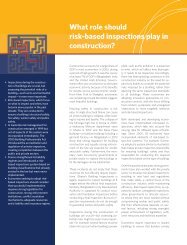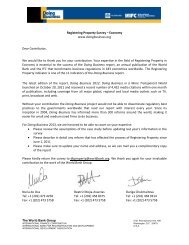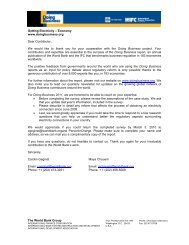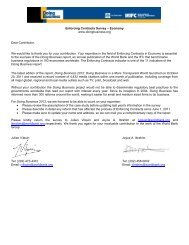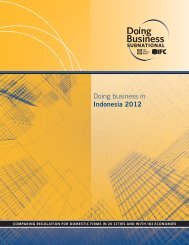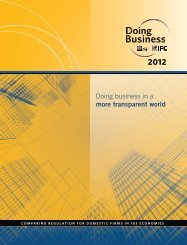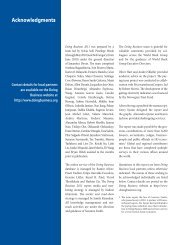Economy Profile: Burundi - Doing Business
Economy Profile: Burundi - Doing Business
Economy Profile: Burundi - Doing Business
Create successful ePaper yourself
Turn your PDF publications into a flip-book with our unique Google optimized e-Paper software.
<strong>Doing</strong> <strong>Business</strong> 2013<br />
<strong>Burundi</strong><br />
93<br />
No.<br />
Procedure<br />
23<br />
24<br />
*<br />
Adjournments: Court proceedings are delayed because one or both parties request and obtain an adjournment<br />
during the oral hearing or trial, resulting in an additional or later trial or hearing date.<br />
Order for submission of final arguments: The judge sets the deadline for the submission of final factual and legal<br />
arguments.<br />
Final arguments: The parties present their final factual and legal arguments to the court either by oral presentation<br />
or by a written submission.<br />
25 Judgment date: The judge sets a date for delivery of the judgment.<br />
26 Notification of judgment in court: The parties are notified of the judgment at a court hearing.<br />
27 Writing of judgment: The judge produces a written copy of the judgment.<br />
28 Registration of judgment: The court office registers the judgment after receiving a written copy of the judgment.<br />
29<br />
30<br />
31<br />
32<br />
Court notification of availability of the written judgment: The court notifies the parties that the written<br />
judgment is available at the courthouse.<br />
Notification of Defendant of judgment: Plaintiff or court formally notifies the Defendant of the judgment. The<br />
appeal period starts to run the day the Defendant is formally notified of the judgment.<br />
Appeal period: By law, Defendant has the opportunity to appeal the judgment during a period specified in the law.<br />
Defendant decides not to appeal. Judgment becomes final the day the appeal period ends.<br />
Reimbursement by Defendant of Plaintiff's court fees: The judgment obliges Defendant to reimburse Plaintiff for<br />
the court fees Plaintiff has advanced, because Defendant has lost the case.<br />
Enforcement of judgment:<br />
*<br />
*<br />
33<br />
*<br />
*<br />
34<br />
35<br />
Plaintiff’s hiring of lawyer: Plaintiff hires a lawyer to enforce the judgment or continues to be represented by a<br />
lawyer during the enforcement of judgment phase.<br />
Plaintiff’s request for enforcement order: Plaintiff applies to the court to obtain the enforcement order ('seal' on<br />
judgment).<br />
Attachment of enforcement order to judgment: The judge attaches the enforcement order (‘seal’) to the<br />
judgment.<br />
Delivery of enforcement order: The court's enforcement order is delivered to a court enforcement officer or a<br />
(private) bailiff.<br />
Plaintiff’s request for physical enforcement: As Plaintiff fears that Defendant might physically resist the<br />
attachment of its movable goods, Plaintiff addresses a request to the judge or to the police authorities to obtain<br />
police assistance during the attachment of Defendant's movable goods.<br />
Judge's order for physical enforcement: The judge orders the police to assist with the physical enforcement of the<br />
attachment of Defendant's movable goods.<br />
Request to Defendant to comply voluntarily with judgment: Plaintiff, a court enforcement officer or a (private)<br />
bailiff requests Defendant to voluntarily comply with the judgment, giving Defendant a last chance to comply<br />
voluntarily with the judgment.



